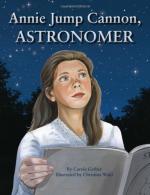|
This section contains 351 words (approx. 2 pages at 300 words per page) |
World of Scientific Discovery on Annie Jump Cannon
Annie Jump Cannon was born in Dover, Delaware, in 1863. Her mother had been very interested in astronomy from her own childhood days, and that interest was infectious. Together, mother and daughter studied the sky from the attic of their house, where they had improvised an observatory.
After graduating from public school, Cannon enrolled in Wellesley College in 1880 to further her interest in astronomy. She became especially interested in stellar spectroscopy, a process in which a star's light is dispersed into its component colors, allowing, among other things, identification of the elements present in the star.
After graduating in 1884, Cannon did not immediately become a professional astronomer. She returned home and became involved in social affairs in Dover. When her mother died in 1893, Cannon returned to Wellesley College, received an M.A. degree, and then attended Radcliffe College in Cambridge, Massachusetts, as a special student in astronomy.
Meanwhile, the nearby Harvard College Observatory was deeply involved in astronomical investigations of all kinds. In 1896, while she was one year into her two-year stint at Radcliffe, Cannon became an assistant at the Harvard Observatory. It was the beginning of a career that would span 44 years. Her experience in spectral classification, the analysis and cataloguing of starlight, was of great value. Although the concept was not new at the end of the 1890s, no one had made a detailed survey of the stars.
Cannon took the time to observe, classify, and analyze the spectra of 350,000 stars, carefully placing them in groups based on their spectra. She also gave lectures, wrote nine other catalogues and numerous short papers, and catalogued many variable star s. Like the detailed planetary observations made by Tycho Brahe 300 years earlier, her work with stars provided a tremendous amount of data for later investigation and comparison of stellar spectra.
Cannon received many honors and awards during her long career. She retired from Harvard in 1940 and died in 1941 at the age of 78. As a tribute to Cannon's achievements, the American Astronomical Society established the Annie Jump Cannon prize in 19834, awarded periodically to a woman who has made exceptional contributions to astronomy.
|
This section contains 351 words (approx. 2 pages at 300 words per page) |


